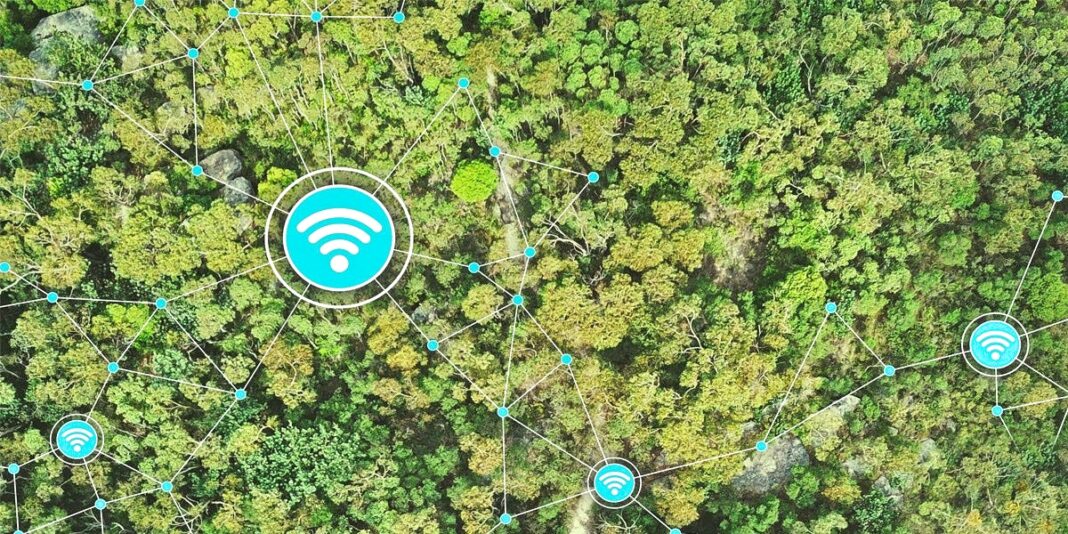Global tech companies at the landmark Artificial Intelligence Summit in Seoul this week pledged to use artificial intelligence technology to revolutionise productivity and create new added value.
Delegates representing the forestry sector, including the UK-based Institute of Chartered Foresters, supported AI as a powerful tool to reverse the adverse effects of human activity on forested areas.
Leaders from Asia, Europe and the US vowed to balance the benefits of AI with safety at the two-day event, the second after an initial summit hosted by the UK in November last year.
Forests cover about 31% of the world’s land area, playing a critical role in maintaining ecological balance, supporting biodiversity, and providing livelihoods and shelter for millions of people.
Yet these vital ecosystems are threatened. The diminishing availability of productive land, competition from other land uses, and climate change will increasingly place global forests in a ‘dangerous cycle’.
AI technology’s capacity to analyse vast datasets to make insightful predictions can significantly enhance the approach to forest management.
A group of seven major democracies at the summit, including South Korea, Australia and Singapore, agreed to share research results to encourage the safe development and use of AI.
Australia was represented by Helen Wilson, Deputy Secretary, Department of Industry, Science and Resources – Science and Technology Group.

South Korean President Yoon Suk Yeol in his welcome address said AI could help solve global issues such as environmental pollution.
“We should balance the risks and opportunities presented by AI,” he said.
At a ministerial level, 28 countries and regions adopted a statement that includes measures such as the popularisation of power-saving semi-conductors in anticipation of a sharp increase in consumption as the use of AI spreads.”
Asian news platform Nikkei said concerns at the summit were also shared with companies that develop or operate AI services. In response, 14 companies, including Google, Microsoft and Samsung Electronics, announced an ‘AI Business Pledge’ with the companies promising to develop policies to identify and appropriately manage AI risks, as well as promoting measures to reduce incorrect information and misinformation generated by AI.
They also agreed to continue to invest in the development of cutting-edge AI models that will dramatically expand human knowledge, improve well-being and create opportunities.
British Government representatives at the summit announced that 16 companies from the US, Canada, France, South Korea, the United Arab Emirates and China — had signed a pledge to safely develop AI.
“AI models will not be made available for use unless their risks have been sufficiently minimised,” a South Korean delegate said.
As AI is increasingly put into practical use, concerns have been raised about fake videos called deepfakes. There are also risks that it could be used to intentionally stir up public tensions or help terrorists develop weapons. At the same time, it also has the potential to reduce people’s workloads and significantly boost productivity.
The summit positioned AI as a tool to bring about innovation in the economy and society while increasing safety. It also set a goal to create an environment in which all people could share the benefits.
Available figures show the world has a total forest area of 4.06 billion hectares. Regulating activities that result in canopy loss such as from harvesting, agricultural expansion and mining is essential for protecting forest ecosystems.
Ensuring regulatory compliance is crucial but is often challenged by the high costs associated with manual monitoring. Employing AI solutions can help reduce labour costs on compliance monitoring and improve accuracy.
By processing vast amounts of satellite data, AI can pinpoint areas of deforestation, track the expansion of agricultural lands into forested territories, and detect signs of illegal logging activities. This real-time surveillance allows for immediate action, facilitating interventions before irreversible damage occurs.
The advent of AI has also opened new horizons in predicting and managing wildfires.
By harnessing the power of AI algorithms, it is now possible to analyse vast datasets encompassing weather patterns, historical fire occurrences, and other environmental factors, providing predictive insight necessary to foresee wildfire outbreaks.
This predictive capability is not just about foreseeing the occurrence of fires but also about understanding their potential severity, spread and impact on ecosystems and human settlements.
Implementing conservation strategies around forests is vital for the protection of biodiversity.
The identification of key habitat profiles to better understand species presence, abundance and distribution is essential to effectively implement targeted conservation strategies.
Meanwhile, Nikkei Asia reports USA and China held their first first formal government-to-government discussion on artificial intelligence in Geneva this week, putting into action one of the agreements that Presidents Joe Biden and Xi Jinping made when they met in California last November.

The US delegation was led by Tarun Chhabra, the National Security Council’s senior director for technology and national security, and Seth Center, the State Department’s acting special envoy for critical and emerging technology.
The China delegation was led by officials from the Foreign Ministry and the National Development and Reform Commission.
Speaking to reporters ahead of the meeting, senior US officials emphasised that the Geneva event would not be a place for dealmaking.
Instead, the goal is to discuss risks associated with advanced AI and to “directly communicate on respective areas of concern,” one official said.
No joint statement or “deliverables” are expected.
Asked if the US delegation was willing to respond to Chinese anger over US export controls on sensitive technologies, the official said, “Our national security measures are not up for negotiation.”
Editor’s note: Artificial Intelligence is a branch of computer science dedicated to creating machines capable of performing tasks that typically require human intelligence. At its core, AI involves the development of algorithms and computational processes that enable computers to learn from data, make decisions and solve problems.
This technology spans several fields, including machine learning, natural language processing, robotics and computer vision, each contributing to the vast capabilities of AI systems.
In forest conservation solutions, machine learning, a subset of AI, has become instrumental in analysing complex environmental data, enabling predictive modelling for deforestation, land use changes, managing wildfires and species distribution mapping.
An algorithm is a finite sequence of mathematically rigorous instructions, typically used to solve a class of specific problems, or to perform a computation.






